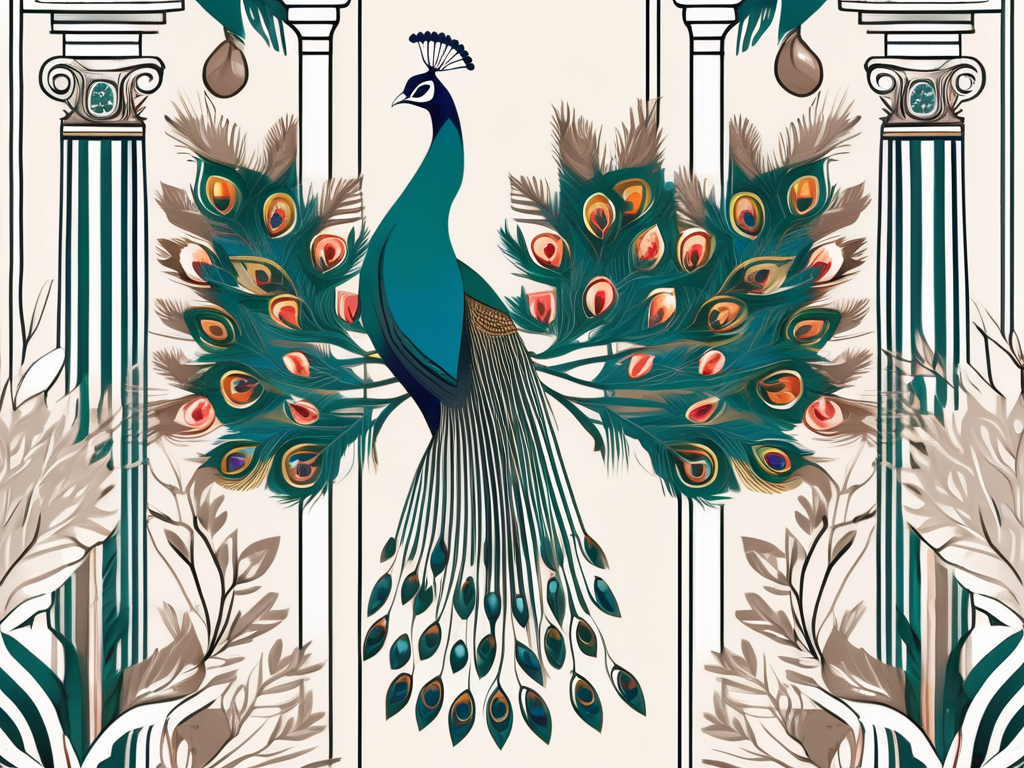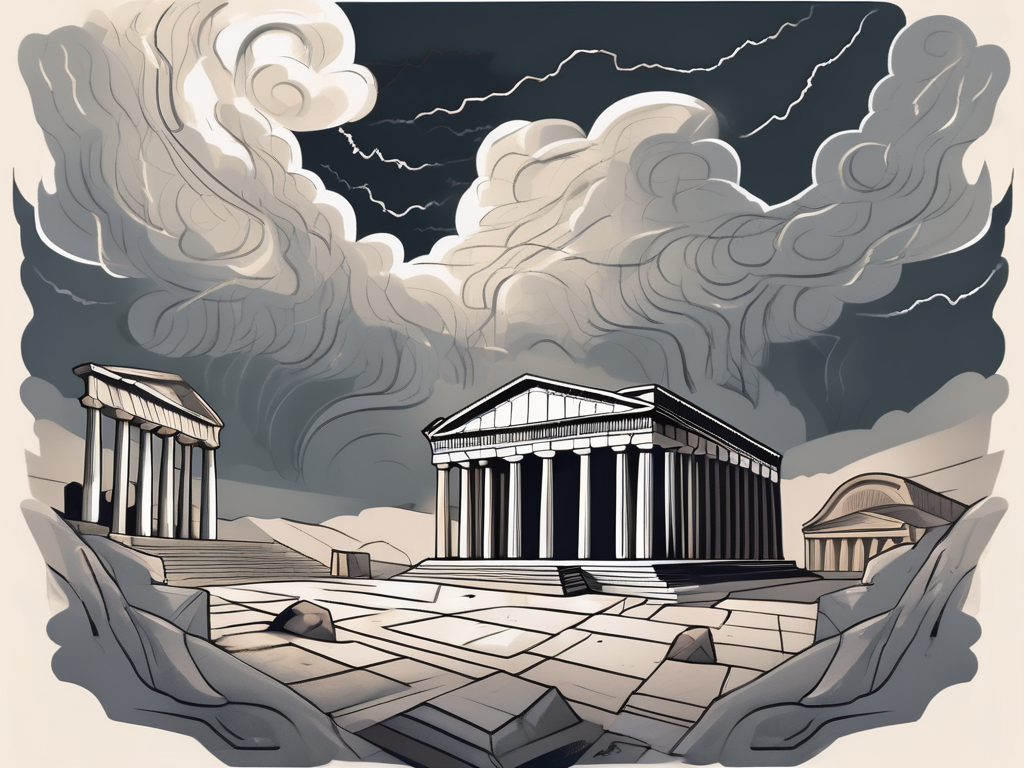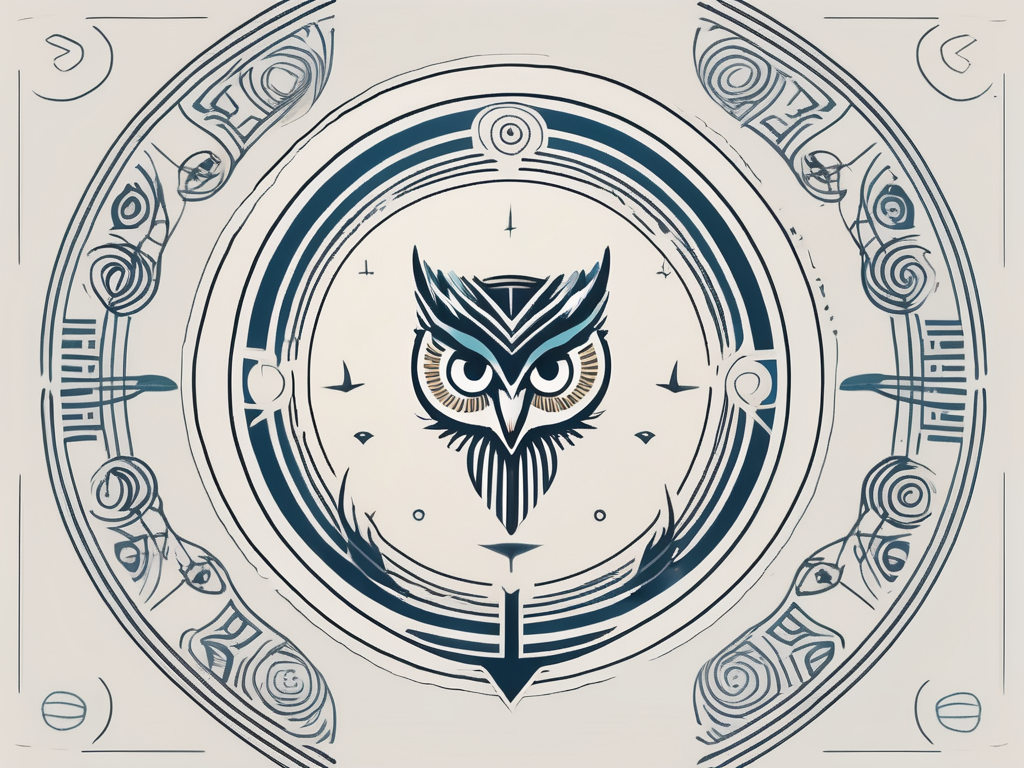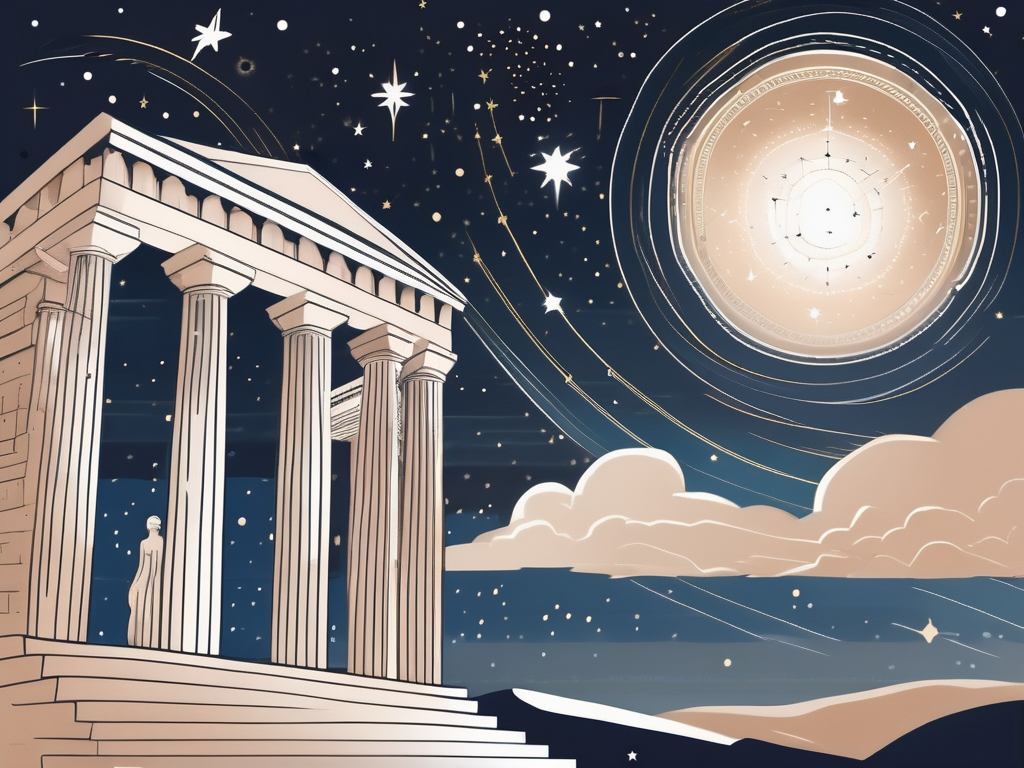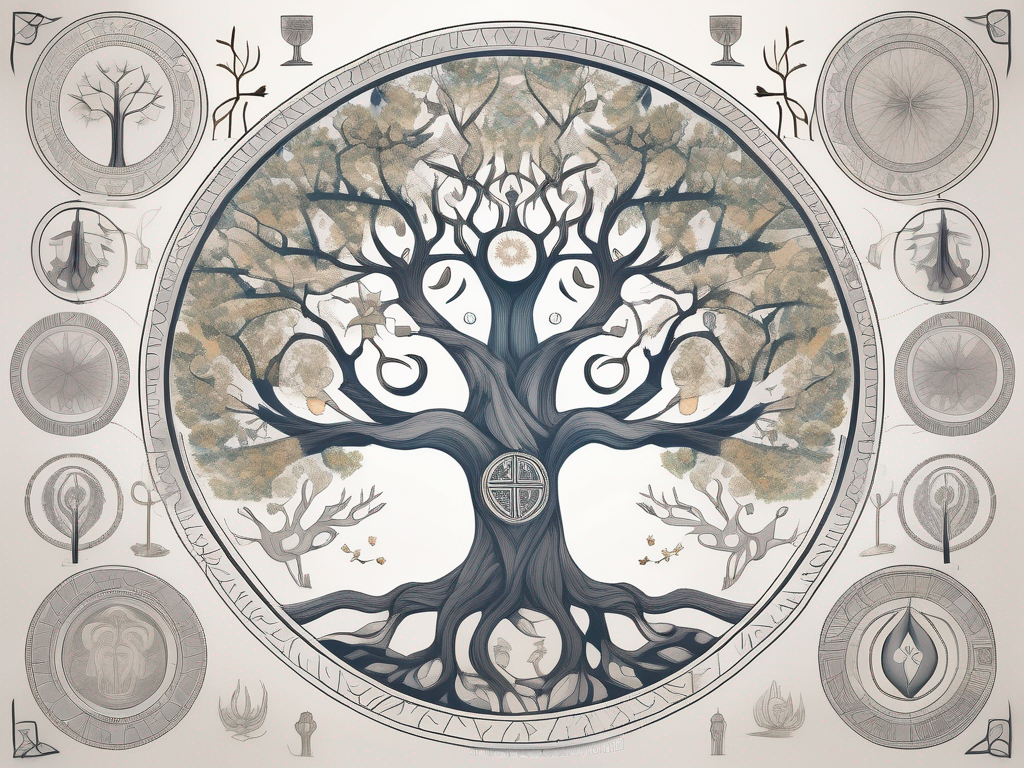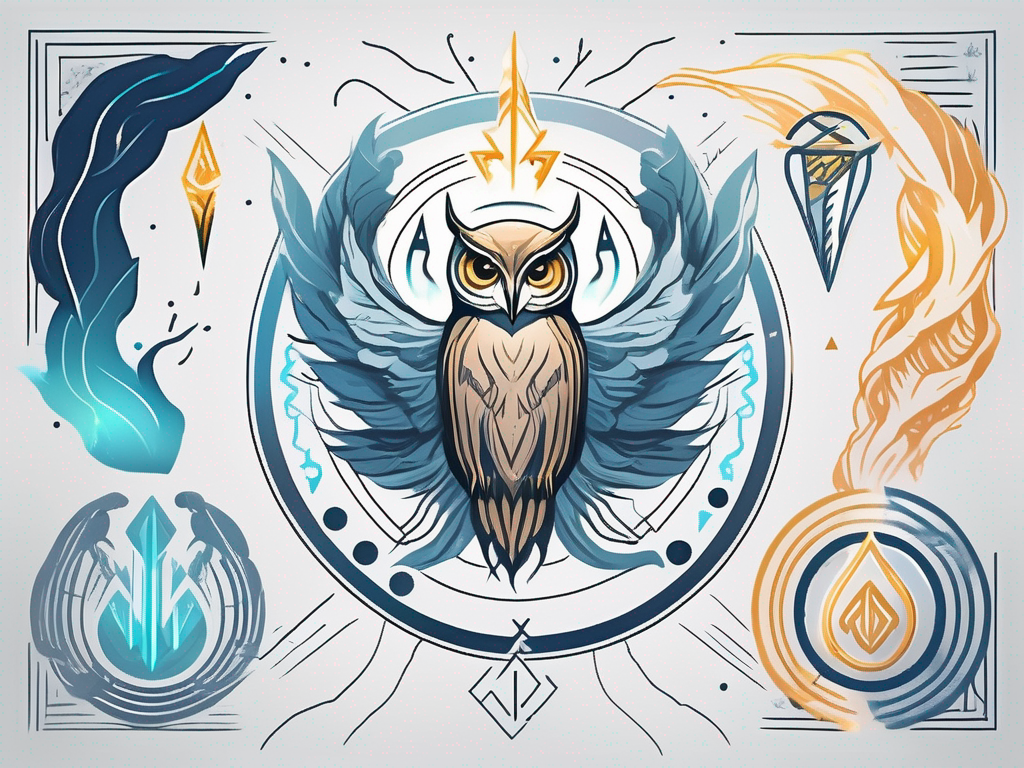Hera, the queen of the gods, is an enigmatic figure in Greek mythology. Known for her power and authority, she wields immense influence over the mortal and divine realms. In this article, we will delve into the multifaceted nature of Hera, exploring her role in Greek mythology, her significance in society, her complex personality, and her enduring legacy in modern culture.
Understanding Hera: The Queen of the Gods
As the queen of the gods, Hera holds a position of great importance in Greek mythology. Her role extends far beyond being the wife of Zeus, the king of the gods. Hera is the goddess of women and marriage, representing the idealized female archetype in ancient Greek society.
But what exactly does it mean to be the queen of the gods? For Hera, it means more than just a title. She is a powerful deity with a significant influence over the lives of mortals and immortals alike. Her divine authority extends to the very fabric of existence, ensuring the harmony and order of the world.
The Role of Hera in Greek Mythology
In Greek mythology, Hera is primarily known for her role as the protector of marriage. She is often depicted as a faithful and committed wife, upholding the sacred bonds of matrimony. But her influence over marriage extends far beyond mortal unions. Hera’s watchful eye also extends to the relationships between gods, ensuring that the divine unions are just as sacred and respected.
Imagine the grandeur of Olympus, where the gods and goddesses reside. It is Hera who maintains the delicate balance and stability within this realm, ensuring the sacredness of marital bonds among the deities. Without her guidance and protection, the very foundation of Olympus could crumble, leading to chaos and discord among the gods.
Hera’s Powers and Symbols
As the queen of the gods, Hera possesses a wide array of powers and symbols that encapsulate her authority. Her dominion extends over the heavens, earth, and sea, showcasing her control over the entire world. With a mere wave of her hand, storms can be calmed, crops can flourish, and the tides can be tamed.
But it is not just her powers that make Hera an awe-inspiring figure. Her symbols also play a significant role in representing her regal status. The majestic peacock, with its vibrant feathers, is an emblem of beauty and immortality. It is a visual representation of Hera’s grace and elegance, a reminder of her divine presence.
And then there is the diadem, a symbol of her authority and power. Worn proudly upon her head, it signifies her position as the ultimate authority figure among the gods. It is a constant reminder to all that Hera is not to be underestimated or challenged.
So, next time you hear the name Hera, remember that she is more than just Zeus’ wife. She is a goddess of immense power, a protector of marriage, and a symbol of female strength and authority. Her influence stretches far and wide, shaping the very fabric of Greek mythology and society.
The Many Faces of Hera: Goddess of Women and Marriage
Hera’s influence reaches beyond the confines of her divine role. She exerts a significant impact on Greek society as the patron goddess of women and marriage.
When it comes to the ancient Greeks, Hera’s influence on women and marriage was profound. She was not just a distant deity, but a relatable figure who understood the struggles and joys of mortal women. As the protector of married women, Hera offered guidance and divine intervention in times of trouble. Women turned to her in moments of marital discord, seeking solace and wisdom. Her presence in their lives reinforced the importance of fidelity and commitment in marriage, reminding them of the sacred bond they shared with their husbands.
But Hera’s influence went beyond individual marriages. Her worship and devotion provided a sense of security and a framework for moral conduct within Greek society. The belief in her watchful eye and her ability to bless or curse marriages created a social fabric that encouraged faithfulness and respect in relationships. In a society where marriage was a cornerstone of stability, Hera’s presence was both comforting and empowering.
Hera’s Complex Character
Beyond her role as a symbol of marital fidelity, Hera’s character is nuanced and complex. She is often portrayed as vengeful and jealous, seeking retribution against Zeus’ many extramarital affairs. Her anger and wrath are legendary, as she punishes both her husband and his lovers with cunning and creativity.
However, Hera can also be compassionate and benevolent, particularly towards those who respect the sanctity of marriage. She rewards those who honor their marital vows and treat their spouses with love and respect. It is in these moments that her divine grace shines through, reminding mortals of the importance of fidelity and commitment.
These contrasting traits make Hera a compelling figure, embodying both the virtues and flaws of humanity. She serves as a reminder that even the gods are not immune to the complexities of human emotions. Through her stories and legends, Hera teaches us about the challenges of love, marriage, and the delicate balance between trust and jealousy.
Hera’s Relationships with Other Gods and Mortals
While Hera’s marriage to Zeus is central to her mythology, her relationships with other gods and mortals also shape her character and narrative.
Hera, the queen of the gods, is known for her complex and tumultuous marriage to Zeus. Their relationship is characterized by a constant interplay of power dynamics. As the king of the gods, Zeus wields immense authority, but Hera is not one to be overshadowed. She asserts her own power and influence, often taking measures to exact revenge on Zeus’ paramours and illegitimate children. This constant struggle for dominance between Hera and Zeus showcases the intricacies of marital relationships, even among the divine.
Despite the challenges they face, Hera and Zeus symbolize the balance of power within the divine realm. Their union represents the eternal struggle between loyalty and infidelity, trust and betrayal. It is a testament to the complexities of love and commitment, even among the gods themselves.
Hera and Zeus: A Divine Power Couple
Hera’s marriage to Zeus is just one facet of her complex relationships within the pantheon of gods. She interacts with other deities in various ways, forming friendships, sustaining rivalries, and engaging in conflicts that shape the course of Greek mythology.
One of Hera’s most notable friendships is with Athena, the goddess of wisdom and warfare. Despite their different domains of influence, Hera and Athena share a mutual respect and admiration for each other’s strengths. They often collaborate to achieve common goals, combining their wisdom and strategic prowess to bring about favorable outcomes.
On the other hand, Hera’s relationship with Aphrodite, the goddess of love and beauty, is fraught with rivalry. Both goddesses vie for the title of the most beautiful, leading to a fierce competition that ultimately involves the judgment of Paris and the infamous Trojan War. This rivalry between Hera and Aphrodite not only showcases their individual ambitions and desires but also highlights the far-reaching consequences of their actions.
In addition to her interactions with fellow gods, Hera’s relationships with mortals also play a significant role in her mythology. She often takes a keen interest in mortal affairs, particularly when it comes to protecting the institution of marriage. Hera is known to bestow blessings upon newlyweds and offer guidance to married couples, ensuring the stability and sanctity of their unions.
However, Hera’s involvement with mortals is not always benevolent. She is notorious for her jealousy and vindictiveness, especially towards those who cross her or threaten her position. Numerous mortals have fallen victim to Hera’s wrath, facing dire consequences for daring to challenge her authority or betray her trust.
Overall, Hera’s relationships with other gods and mortals provide a rich tapestry of stories and mythological narratives. They offer a glimpse into the multifaceted nature of her character and her impact on the divine hierarchy. Whether as a powerful queen, a loyal friend, a fierce rival, or a vengeful goddess, Hera’s interactions shape the course of Greek mythology and leave a lasting impression on the collective imagination.
Hera’s Legacy in Modern Culture
The mythical power of Hera continues to resonate in modern culture, leaving an indelible mark on literature, art, and our interpretations of her mythology.
Hera in Literature and Art
Throughout history, Hera’s influence has inspired countless writers and artists. From ancient plays to modern novels, her character has been reimagined and interpreted in a myriad of ways. Artists have captured her majesty and beauty through sculptures and paintings, ensuring that her legacy endures for generations to come.
The Modern Interpretation of Hera’s Mythology
Today, Hera’s mythology continues to be explored and reinterpreted. Many authors and scholars analyze her character with a fresh perspective, examining her complexities and the societal implications of her role as the goddess of women and marriage.
This ongoing exploration ensures that Hera’s power transcends time, allowing us to delve deeper into her mystical realm.
In conclusion, understanding the mythical power of Hera requires a comprehensive exploration of her various roles, relationships, and legacy. As the queen of the gods, patron goddess of women and marriage, and a complex character, she remains an iconic figure in Greek mythology. Hera’s enduring influence in modern culture further emphasizes her mythical power, inviting us to delve into her captivating world.
